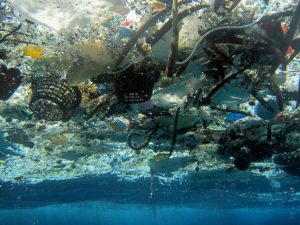With the ever growing population of 7.4 billion people, it is obvious there is an increase in the amount of plastic pollution that is produced around the world. The human race has become accustomed to living a certain ‘on the go’ lifestyle as we continue to see easily disposable items as a requirement in daily life. Plastic water bottles, straws, shopping bags and coffee cups are just a few examples of the waste that contributes to plastic pollution in our oceans. Upwards of 51 trillion microscopic pieces of plastic (269,000 tons) floats in the ocean as we make daily choices that add to the enormous pile of trash that directly affects our environment and ecosystems.
As this plastic gathers in an area, it negatively impacts our environment and puts all wildlife, including plants, marine life and even the human population at risk. Because plastic is such a popular and durable material, it is often forgotten how harmful and toxic it actually is. The chemicals found in plastic often include polycyclic aromatic hydrocarbons (PAHs) and polychlorinated biphenyls (PCBs). These chemicals are described as “priority pollutants” by the Environmental Protection Agency and compromises 78 percent of the plastic associated with the litter embedded in our oceans.
After truths of this destruction have come further into light, the question is; can humans develop ways to put an end to waste entirely? That’s the idea behind living a zero waste lifestyle, a style of living that has become a common trend amongst millennials and young adults who strive to accumulate as little trash as possible. If you care about the environment and helping our world’s ecosystems, take a look at some of my tips below for a beginners guide to zero waste.
- Buy reusable utensils and straws
My first step in reducing waste was to carry around my own personal reusable cutlery set that I could easily fit into my bag whenever I grab food on the go. Rather than use the plastic disposable set they provide (which is usually wrapped in another plastic slip) go ahead and let em’ know you got your own and you won’t be needing it. If you are a caffeine addict like me, you are going to need a good reusable straw as well. Check out the stainless steel ones- they’re affordable and make your coffee taste ice cold. Buy them in packs of 10 so you can keep some at home and some in your backpack. If you got some extra cash pick yourself up a nice reusable coffee mug, my favorite is by KeepCup.
- Reusable Grocery Bags and Produce Bags
If you live in California, this is a tip you might already be accustomed to if you do not like paying 10 cents a bag every time you leave Raley’s. Rather than use the paper or plastic bags of your preferred grocery store, keep reusable canvas bags in your car to abstain from the unnecessary use of plastic. If you aren’t in the budget to buy reusable bags on Amazon, reuse the bags you already have! Use the ones you kept from your shopping trip to Urban Outfitters or the bags from your last grocery store errand.
- Homemade toiletries
There’s no question that the bathroom is one of the places where waste piles up in abundance. As a consumerist society, we use so many products! Shampoos, conditioners, toothpaste and deodorants are usually non-recyclable which seemingly makes zero waste so hard. Luckily, there are so many homemade recipes for these things on the internet that it makes it easy for us to make our own! First step, buy some mason jars or glass bottles to store your concoctions. Next, research different recipes to make your own products! Most daily use items like toothpaste and deodorants use simple ingredients like essential oils and coconut oil. If you don’t have the time to make your own, do not worry! Just support and buy from brands that reuse and recycle materials with sustainable ingredients. My favorites are Love, Beauty and Planet (their bottles are 100 percent recycled!) and Tom’s of Maine. Below are some of my favorite videos that show how to make your own products.
Zero Waste Toothpaste and Mouthwash
Start integrating these tips into your daily routines and habits, and we will all be one step closer to a waste free lifestyle and cleaner planet.


2 comments for “A Beginners Guide to Zero Waste Lifestyle”